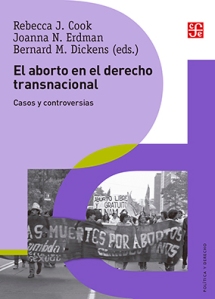SUBSCRIBE TO REPROHEALTHLAW: To receive these updates monthly by email, enter your address in upper right corner of this webpage, then check your email to confirm the subscription.
SCHOLARSHIP:
Abortion by telemedicine in Northern Ireland: patient and professional rights across borders, by Tamara Hervey and Sally Sheldon. Northern Ireland Legal Quarterly (2017) 68.1: 1-33 Article online.
[abortion law, conscientious objection, Chile] “A critical review of conscientious objection and decriminalisation of abortion in Chile,” by Adela Montero and Raúl Villarroel, Journal of Medical Ethics, preview online Jan. 6, 2018
[abortion law in Sweden, Norway and Finland] Dropping the ball or holding the line? Challenges to abortion laws in the Nordic countries, Heli Askola (Faculty of Law, Monash University) Women’s Studies International Forum 66 (Jan-Feb 2018): 25-32.
Institutional access
[abortion Law, Uruguay] Legal barriers to access abortion services through a human rights lens: the Uruguayan experience,” by Lucía Berro Pizzarossa, Reproductive Health Matters 26.52 (2018): preview online Jan. 17, 2018
Abortion Law in Transnational Perspective: Cases and Controversies, ed. Rebecca J. Cook, Joanna N. Erdman and Bernard M. Dickens (University of Pennsylvania Press, 2014), now also in Spanish (see next entry) and in paperback, 20% discount code PH70. English edition. Table of Contents with chapter summaries.
Abortion Decisions Online
El aborto en el derecho transnacional: casos y controversias, ed. Rebecca J. Cook, Joanna N. Erdman y Bernard M. Dickens (Mexico: FCE/CIDE, 2016) En espanol, 2016: Fondo de Cultura Económica y Libreria CIDE. Índice con resúmenes de capítulos 1-16
Decisiones Judiciales sobre aborto en línea
[Africa] Legal Grounds III: Reproductive and Sexual Rights in Sub-Saharan African Courts (Pretoria, Pretoria University Law Press (PULP), 2017). PDF 228 page book. Previous volumes PDF online at CRR. Printed edition from PULP.
Online edition with links to decisions and updates.
FIGO Bioethics Curriculum: Introduction to Principles and Practice of Bioethics: Case Studies in Women’s Health. Table of Contents and List of Case Studies Curriculum in English. Curriculum in Spanish Ahora en Español!
“Freedom of conscience in Europe? An analysis of three cases of midwives with conscientious objection to abortion,” by Valerie Fleming, Beate Ramsayer, Teja Škodič Zakšek, Journal of Medical Ethics (2018) 44: 104-108 Article online.
Portuguese edition online: Reproductive Health and Human Rights: Integrating Medicine, Ethics and Law, (Oxford University Press, 2003) English (Oxford Scholarship Online) en Francais en Portugues, 602 pages\. Spanish / Español Case Studies in Arabic
US-focused news, resources, and legal developments are available on Repro Rights Prof Blog. View or subscribe.
NEWS:
New “Framework Convention on Global Health Alliance“ aims to facilitate a coordinated global treaty for the Right to “the highest attainable level of health.” For an overview, see: “Turning the Right to Health into the Lived Reality for Everyone” by Dr. Martin Hevia (Founding Chair): Overview online.
Canada: Court dismisses anti-abortion group’s injunction request about refusal of Canada Summer Jobs funding. News report.
Germany: Doctor fined 6000 euros for illegally “advertising” abortions, having listed “abortion” among other medical specialties on her website. It is illegal to advertise abortion services in a way that is to one’s own economic advantage. News article. Section 219a of the German criminal code, in German. See new comment by Stephanie Schlitt, “Criminal prohibition of abortion “advertising” restricts information provision,” Brief comment. Detailed comment.
Ireland: Government announces referendum on the 8th Amendment of the Constitution which limits abortion access, following recommendations of the Joint Committee of the Irish Parliament (the Oireachtas). Jan. 30, 2018 news. Comment by Christina Zampas.
Comment by Mercedes Cavallo.
JOBS
Links to employers in the field of Reproductive and Sexual Health Law are online here
______________
Compiled by the Coordinator of the International Reproductive and Sexual Health Law Program, reprohealth*law at utoronto.ca For Program publications and resources, see our website, online here. TO JOIN THIS BLOG: enter your email address in upper right corner of this webpage, then check your email to confirm the subscription.



 Posted by reprohealthlaw
Posted by reprohealthlaw 




